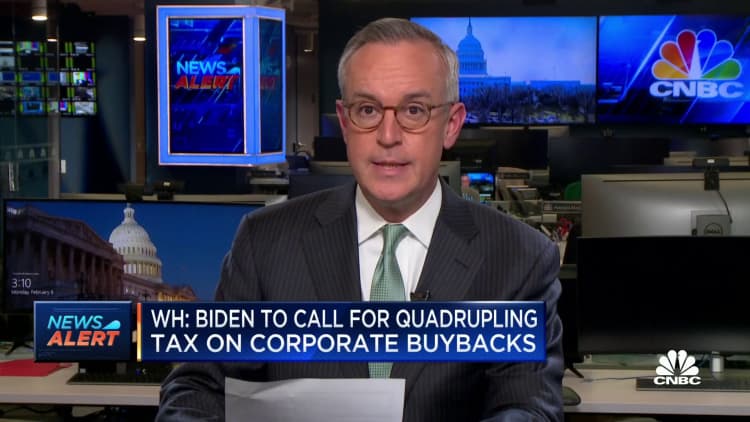WASHINGTON — If his recent speeches are any indication, U.S. President Joe Biden will likely celebrate his handling of the economy in his State of the Union address to Congress on Tuesday, citing decades-low unemployment, slowing inflation rates and robust GDP growth.
But the full picture is far more complicated.
The U.S. economy is in an overall delicate state. Several key indicators such as unemployment, at a nearly 54-year low, and GDP show signs of robust growth, but inflation is still at a four-decade high and the Federal Reserve raised rates eight times over the last year in pursuit of an elusive soft landing to avert a recession.
The Fed has hiked the benchmark rate from effectively zero when Biden delivered his State of the Union a year ago to a target range of 4.5% to 4.75%, the highest since October 2007. Fed Chairman Jerome Powell has given little indication the Fed is finished raising rates, with the goal of pushing inflation to a target of 2%.

At the same time, Friday's jobs report showed the lowest unemployment rate since May 1969 at 3.4%, below the 3.6% predicted by economists. Biden cheered the numbers in a speech Friday, saying 12 million jobs have been created since he took office, "the strongest two years of job growth in history by a long shot."
"Put simply, I would argue the Biden economic plan is working. For the past two years we've heard a chorus of critics write off my economic plan," Biden said. "Today's data makes crystal clear what I've always known in my gut: These critics and cynics are wrong."
Those jobs numbers, however, don't fully take into account the rebound in jobs at the U.S. companies that were hiring after downsizing and laying off scores of employees during the pandemic.
Until now, Biden has had the blessing of a Democratic-controlled Congress with majorities in both the House and Senate. Still, passing his economic legislative priorities hasn't been easy, and with the House now in Republican hands, it's about to get even harder.
The White House is already seeing challenges under House Speaker Kevin McCarthy and the new Republican majority. House Republicans have been in a fraught standoff with the White House over raising the debt ceiling, a topic the White House has said is not up for negotiation. Instead of tying government spending cuts to the debt ceiling vote as House Republicans wish, the president wants to deal with GOP demands to curtail spending in separate budget negotiations later this year.
Raising the debt limit does not clear the way for any new spending; it merely allows the government to cover its preexisting commitments.
McCarthy is leading with a historically slim majority. On top of that, several fiscal hard-liners have made it clear they're willing to force a default on the national debt if they don't get massive spending cuts in return.
A government default on its debt would come with massive consequences. The unprecedented move could halt daily operations within the federal government and cause turmoil in equity markets and the broader economy.
A Moody's Analytics report last year said a default on Treasury bonds could throw the U.S. economy into a tailspin as bad as the Great Recession. If the U.S. were to default, gross domestic product would drop 4% and 6 million workers would lose their jobs, Moody's projected.
Looking to avoid that, the White House has asked that the debt ceiling be lifted without stipulations, as was done three times under former President Donald Trump. The Republican president added $7.8 trillion to the federal debt under his watch.
Biden has repeatedly warned that plans proposed by House Republicans could derail the economic progress and urged Americans to stay the course. The president in recent weeks has touted positive indicators as evidence that his economic plan is working.
Last month Biden welcomed news that a key indicator of inflation fell for the first time in more than two years, stating "it's clearer than ever" that his economic policies are working. The overall consumer price index dropped 0.1% in December from the prior month, marking the largest month-over-month decrease since April 2020. Overall CPI rose 6.5% from a year ago, the smallest increase since October 2021.
In the same speech, he hailed a report finding U.S. gross domestic product rose at a 2.9% annualized pace in the fourth quarter, slightly beating expectations.
Halfway through his term, the White House is shaking up several key personnel, including many key architects of Biden's economic policy to date. The White House on Friday announced that National Economic Council Director Brian Deese, Biden's top economic aide, is departing. The administration has yet to confirm who will replace Deese, but sources familiar with the matter tell CNBC that Federal Reserve Vice Chair Lael Brainard is the top pick. Though the decision is not final, Jared Bernstein is said to be Biden's choice to helm the Council of Economic Advisers.
Jeff Zients, former White House Covid-19 response coordinator under Biden and an economic advisor to former President Barack Obama, will replace Ron Klain as White House chief of staff. The position is among the most influential presidential posts.


